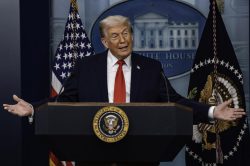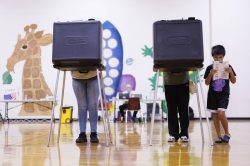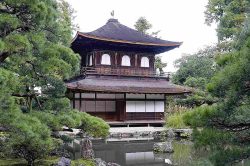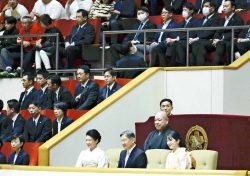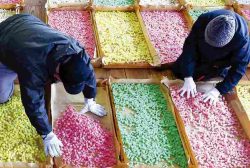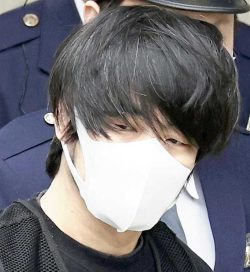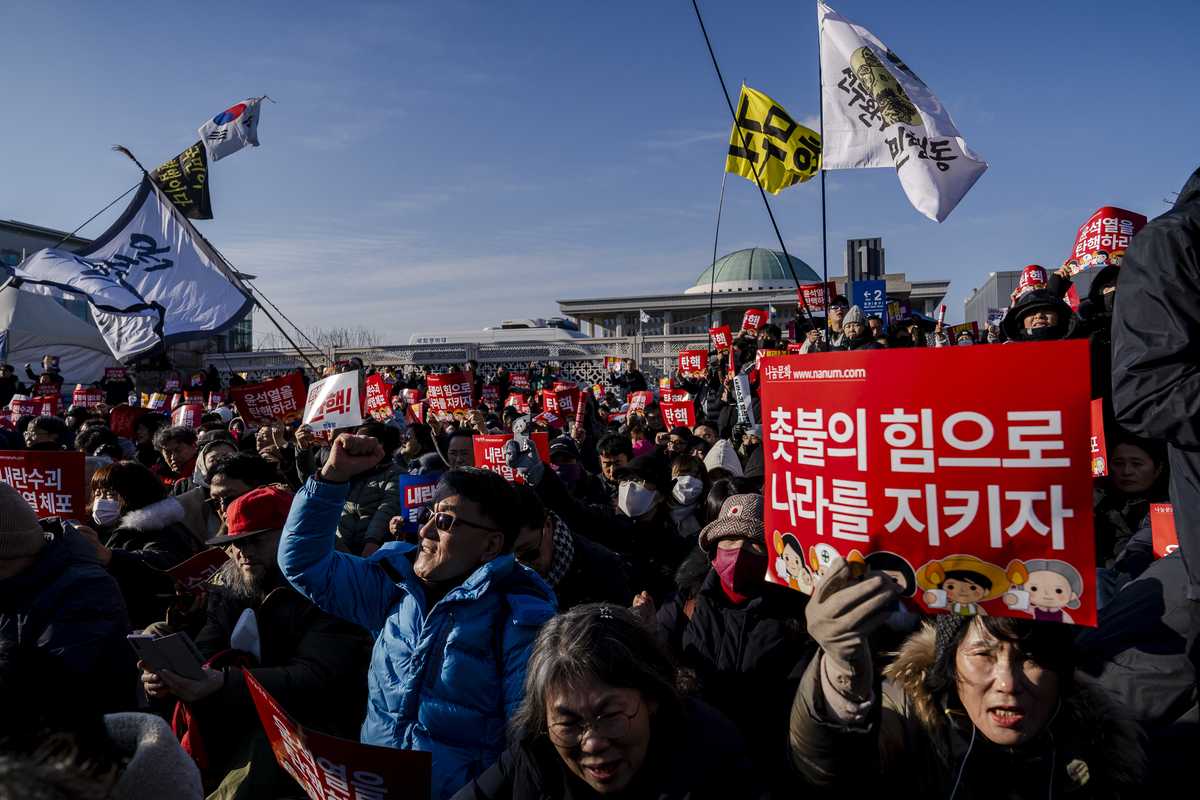
People gather to protest in front of the National Assembly on Saturday.
17:32 JST, December 8, 2024
SEOUL – South Korean President Yoon Suk Yeol will remain in office even after his extraordinary and ill-fated attempt to impose martial law this week, after the National Assembly on Saturday failed to pass a bill to impeach him following a boycott by the president’s ruling party.
Yoon rescinded his martial law decree after only six hours Wednesday when a majority in the assembly – including 18 members of his conservative People Power Party – voted to overturn it. But party lawmakers rallied to support their president Saturday night, apparently more concerned about a return to progressive leadership than about Yoon’s actions.
The motion required support from a two-thirds majority, or 200 votes, to pass. Because Yoon’s party controls 108 of the 300 seats in the Democratic-controlled National Assembly, at least eight lawmakers from his party needed to cross the aisle for the motion to pass.
On Saturday, all but one PPP lawmaker initially boycotted the vote by leaving the chamber. Then two members returned to cast their ballot. The speaker of the National Assembly pleaded with PPP members to return, saying it was critical to South Korea’s democratic process.
But no other lawmaker returned to the chamber, forcing an end to the vote three hours after members began casting ballots. Only 195 lawmakers cast ballots, five short of the number needed to open the ballot box and begin counting.
“How do you think the people, the world, and history, will view us now? Are you not afraid of the judgment of history?” said Woo Won-shik, the National Assembly speaker, as he urged lawmakers to return to the chamber and cast their vote.
The failed vote is likely to trigger further political disarray and growing public demands for the president’s resignation. The opposition leader has vowed to impeach Yoon, and lawmakers are considering filing a new impeachment motion next week. The national police have opened an investigation into Yoon on treason accusations by opposition parties and activists.
Hours before the vote, Yoon apologized to citizens who suffered “anxiety and inconvenience” and said he would not evade “legal and political responsibility” over the declaration.
He also promised there would not be a second martial law order. “I will entrust my party to take measures to stabilize the political situation moving forward, including my term in office,” Yoon said.
Tens of thousands of people gathered outside of the National Assembly to call for Yoon’s impeachment, braving freezing temperatures and holding a candlelight protest during the vote Saturday. Young fans of K-pop groups joined the protest with their favorite band’s light sticks, and families brought children to witness the historical moment. Protesters chanted, “Impeach Yoon,” “Step down” and “Arrest him!”
Many expressed disappointment but said they were not surprised by what had happened.
“Our country should not be heading in this direction,” said Kim Jong-mon, 69, who joined the protest. “So many sacrifices were made in the past to overthrow military dictatorship. Seeing what happened today, I’m incredibly disappointed.”
Some protest attendees said they felt empowered by the large turnout, even though things didn’t go as they had hoped.
“South Korea is facing its greatest crisis right now, but I also think this crisis could become an opportunity,” said Kim Min-soo, 45, who came to the protest with his wife and two young daughters.
Yoon stunned the nation Tuesday by declaring martial law for the first time in more than four decades. Within hours, the parliament thwarted his effort by voting in an emergency session to lift martial law, as thousands of Koreans gathered at the National Assembly to call for a return to democratic government.
Before Saturday’s vote, some liberal lawmakers had expressed concerns that a failed impeachment vote could embolden Yoon to take even more drastic measures against his opponents. The presidential office said Yoon had anticipated the reversal and intended it as a warning to lawmakers, whom the conservative president believes are the root of a gridlock between the Democratic-controlled parliament and his executive branch.
“If the president says this incident was a warning, doesn’t that mean he will do it right next time? Isn’t that more dangerous?” said Jung Sung-ho, a Democratic Party lawmaker, in a local radio interview on Thursday.
By the time voting began Saturday, the PPP side of the chamber had mostly cleared out after the party said it would not participate.
In response, progressive lawmakers stood up in the chamber and read the name of every PPP lawmaker who had left and demanded they return to the chamber. Only Ahn Cheol-soo, a high-profile member and former presidential candidate, remained in the chamber on the conservative side, sitting alone in silence as the names were called.
Then two lawmakers returned to vote, and the chamber exploded in applause. However, one of those lawmakers said he had voted against impeachment.
Opposition parties have repeatedly called for Yoon’s impeachment, but this is the first time they succeeded in bringing a motion to parliament. Opposition lawmakers have said that if Saturday’s vote failed, they would find future opportunities try again to oust him.
It is unclear whether the outcome will be a catalyst for sustained, large-scale protests similar to the months-long candlelight demonstrations that preceded the eventual ouster of President Park Geun-hye in 2017. The majority of South Koreans supported impeaching Yoon following the martial law gambit, polls showed.
“I have no doubt that Yoon would attempt another self-coup,” said Cho Hee-kyoung, law professor at Hongik University in Seoul. “If the impeachment motion doesn’t pass, I think you’ll see a lot more people on the streets. It will once again be down to the people to put pressure on the conservative politicians.”
There were plenty of signs of public discontent over Yoon’s decision to invoke martial law, which for many South Koreans resurfaced traumatic memories of the nation’s brutal past of military dictatorships and uprisings that killed hundreds of people. Before South Korea democratized in 1987, it was led by authoritarian strongmen, and martial laws and uprisings were not uncommon.
But lawmakers in Yoon’s party remained loyal to him and protected the president.
“Around the world, we’ve now seen multiple instances of conservative parties putting party over country and we can now add Korean conservatives to that list,” said Karl Friedhoff, Asia studies expert at the Chicago Council on Global Affairs. “How his presidency ends will much depend on what kind of protests the Korean public are willing to sustain.”
Police on Thursday opened an investigation into Yoon on treason accusations by opposition parties and activists, and prosecutors placed under a travel ban Kim Yong-hyun, Yoon’s defense minister, who resigned after encouraging the president to declare martial law, and has been replaced.
Yoon is now the third president since South Korea became a democracy to face impeachment proceedings. Park was impeached and removed from office in 2017 after a corruption scandal. In 2004, Roh Moo-hyun was impeached after charges of illegal campaigning but was reinstated after the Constitutional Court rejected the charges.
Yoon was elected in 2022 with the narrowest margin in South Korean democratic history and is about halfway into his single five-year term.
Top Articles in News Services
-

Prudential Life Expected to Face Inspection over Fraud
-

South Korea Prosecutor Seeks Death Penalty for Ex-President Yoon over Martial Law (Update)
-

Trump Names Former Federal Reserve Governor Warsh as the Next Fed Chair, Replacing Powell
-

Suzuki Overtakes Nissan as Japan’s Third‑Largest Automaker in 2025
-

Japan’s Nikkei Stock Average Alls from Record as Tech Shares Retreat; Topix Rises (UPDATE 1)
JN ACCESS RANKING
-

Univ. in Japan, Tokyo-Based Startup to Develop Satellite for Disaster Prevention Measures, Bears
-

JAL, ANA Cancel Flights During 3-day Holiday Weekend due to Blizzard
-

Japan Institute to Use Domestic Commercial Optical Lattice Clock to Set Japan Standard Time
-

China Eyes Rare Earth Foothold in Malaysia to Maintain Dominance, Counter Japan, U.S.
-

Japan, Qatar Ministers Agree on Need for Stable Energy Supplies; Motegi, Qatari Prime Minister Al-Thani Affirm Commitment to Cooperation




